The end of 2019 saw the tick-borne pathogens Babesia venatorum and tick-borne encephalitis confirmed as endemic in the UK. Both these pathogens are transmitted by Ixodes spp. ticks and are serious zoonoses. We continue to hope that Brexit negotiations will prompt action to legislate compulsory tick treatment for pets entering the UK, screening of imported dogs for tick-borne pathogens and increased regulation regarding the importation of rescue dogs from abroad in a bid to reduce the risk of exotic ticks and tick-borne pathogens entering the UK. Although foreign travel is currently on hold, we still need to be prepared to correctly advise pet owners planning to take their pets abroad in the future. No tick product is 100% efficacious, making vigilance for ticks on travelled pets and their safe removal vitally important. Pet owners should be advised on the best methods to reduce the risks of pathogen transmission, both for their pets and themselves. Tick removal devices are now readily available to buy from many veterinary practices and pet shops (Figure 1).
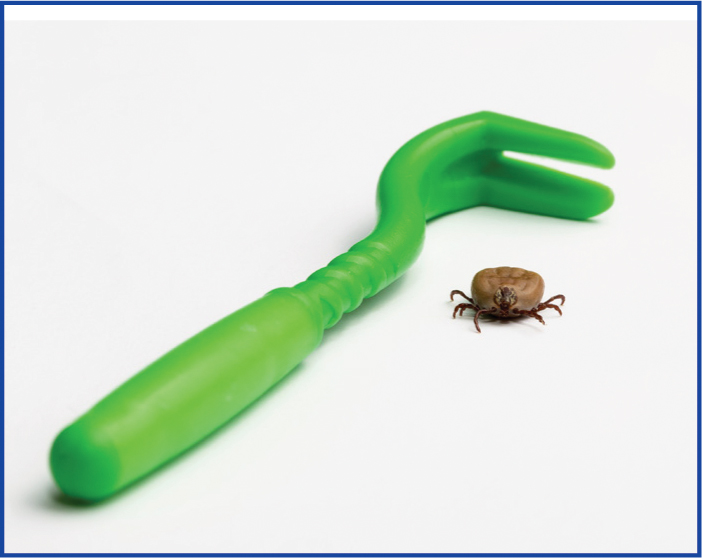
Lyme disease remains a growing endemic risk in the UK, and increased awareness among pet owners and the public is especially important after a recent study has supported an association between Lyme positive dogs and human exposure linked to shared environmental exposure (Liu et al, 2019). Positive dogs are therefore sentinels for human infection and owners of positive dogs should be aware of the possibility that they may also have been exposed.
Angiostrongylus vasorum lungworm
It has been brought to the attention of ESCCAP UK and Ireland by veterinary surgeons that routine preventative treatment against Angiostrongylus vasorum is dropping in the midst of the current COVID-19 pandemic, and an increase in cases of angiostrongylosis are being seen as a result. Angiostrongylosis can be fatal in dogs and is an example of how vital routine parasite prevention and treatment is (Figure 2). Most veterinary practices have implemented systems to manage the dispensing of treatments while maintaining social distancing and every effort should be made to ensure the pet owners continue to follow parasite control programmes.
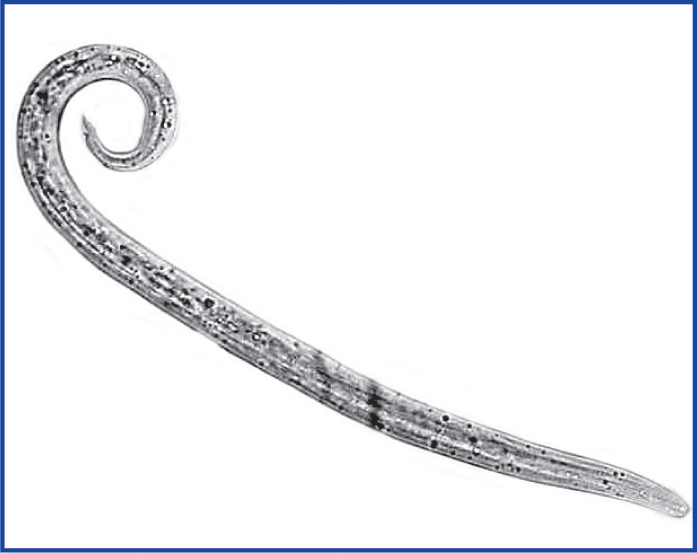
The presence of high prevalence focal areas of A. vasorum across the UK means that effective diagnostic testing is required to rapidly diagnose clinically affected animals. Testing dogs with relevant clinical signs to confirm A. vasorum infection is also important to update preventative advice based on geographic incidence. A variety of tests are available to assist the diagnosis of A. vasorum infection in dogs, including the Baermann technique and antigen testing. While remaining the foundation of lungworm diagnosis, the Baermann technique can now be used in association with more veterinary practice-friendly, commercially available antigen tests for A. vasorum infection, which reliably indicate infection (ESCCAP UK and Ireland, 2019).
A recently published study has shown a continuing lack of awareness in the community about A. vasorum and the risks it poses to dogs. The online survey of 1500 dog owners was conducted in April 2019 by Atomik Research for Vets4Pets (Woodmansey, 2019). Key findings include:
To increase understanding of the parasite, ESCCAP UK and Ireland has created a new A. vasorum diagnosis information sheet summarising the spread of this parasite in the UK, the importance of testing dogs with relevant clinical signs and routine screening. It also contains a flow chart to help take a systematic approach to diagnosing clinical cases (Figure 3). The information sheet is available to download from the ESCCAP UK & Ireland website: www.esccapuk.org.uk.
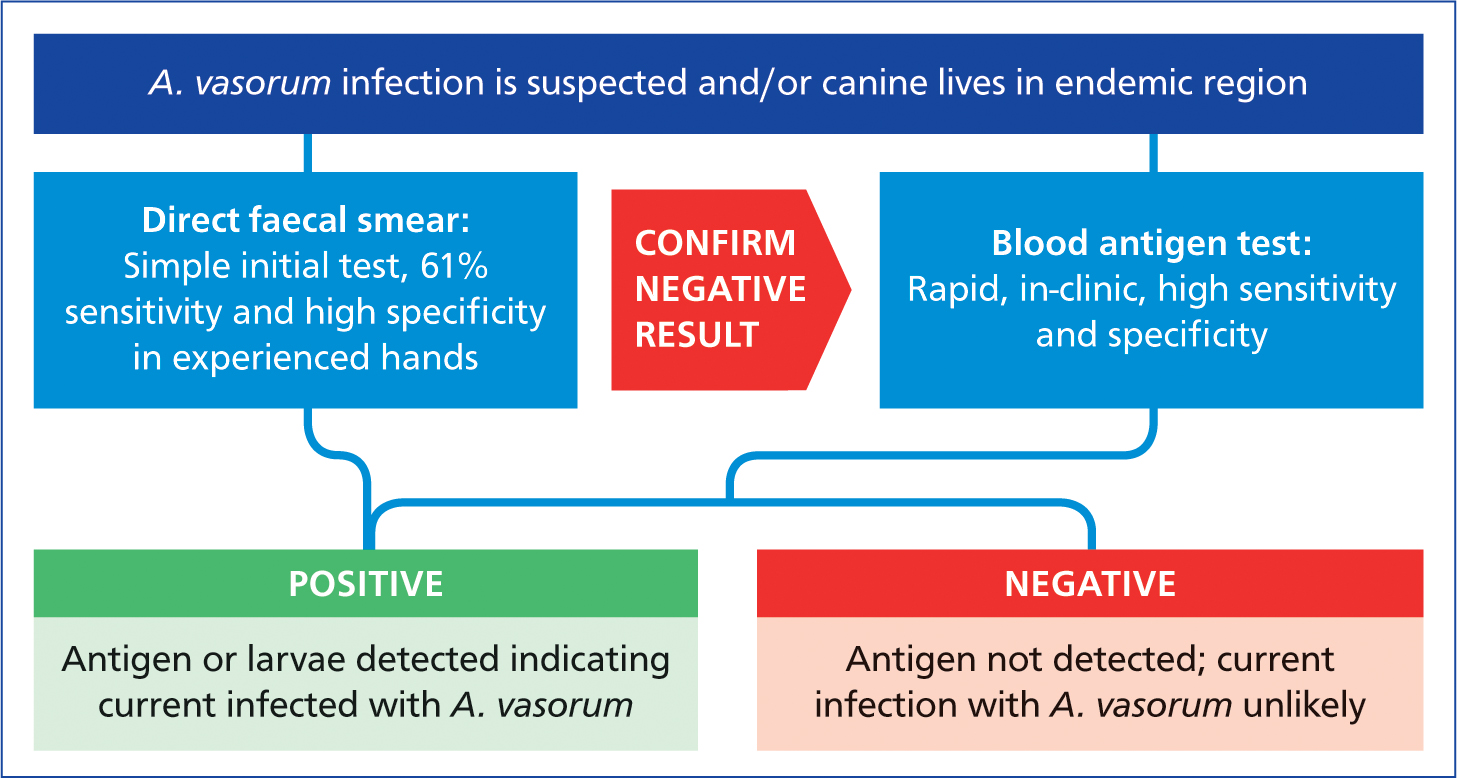
Giardia spp.
Reporting of Giardia spp. infections is increasing and giardiasis remains an important differential for cats and dogs presenting with gastrointestinal signs. Giardia spp. are transmitted by ingesting cysts present in the faeces of other infected animals. Once in the environment, the cysts are immediately infectious to other animals by contaminating ground, food or water and only a few cysts are needed to cause infection. Patency usually persists for several weeks or months and reinfection is common.
Giardia spp. is a global, widespread parasite and infection can cause watery, soft, sometimes intermittent, diarrhoea in all species. However, the majority of infected dogs and cats do not present clinical signs. The parasite occurs commonly in densely populated environments such as kennels, pet shops and animal shelters because of its infectious nature. Prognosis is good in most cases but young, debilitated, geriatric or immunocompromised animals are at increased risk of complications.
Giardia spp. infection can be diagnosed by faecal examination of symptomatic dogs and cats with direct smear, faecal flotation or an antigen test. Diagnostic testing should be repeated in animals where clinical signs have not improved following treatment. Alongside therapy treatment for animals presenting clinical signs and testing positive for Giardia spp., control within the environment is also advised to reduce contamination and the risk of reinfection. Kennel environments should be cleaned, dried and disinfected with chlorine bleach, chloroxylenol or quaternary ammonium compounds. The areas should then be allowed to dry for 48 hours before reintroducing pets. Bedding should be washed at 60 °C or above. (ESCCAP, 2019)
Enquiries
In the first 3 months of 2020, ESCCAP UK and Ireland received many enquiries from veterinary professionals and the public regarding a wide range of parasite topics (Figure 4). Previously, and spring 2019 was no exception, the most enquires related to exotic parasites, but this has shifted this quarter to domestic parasites.
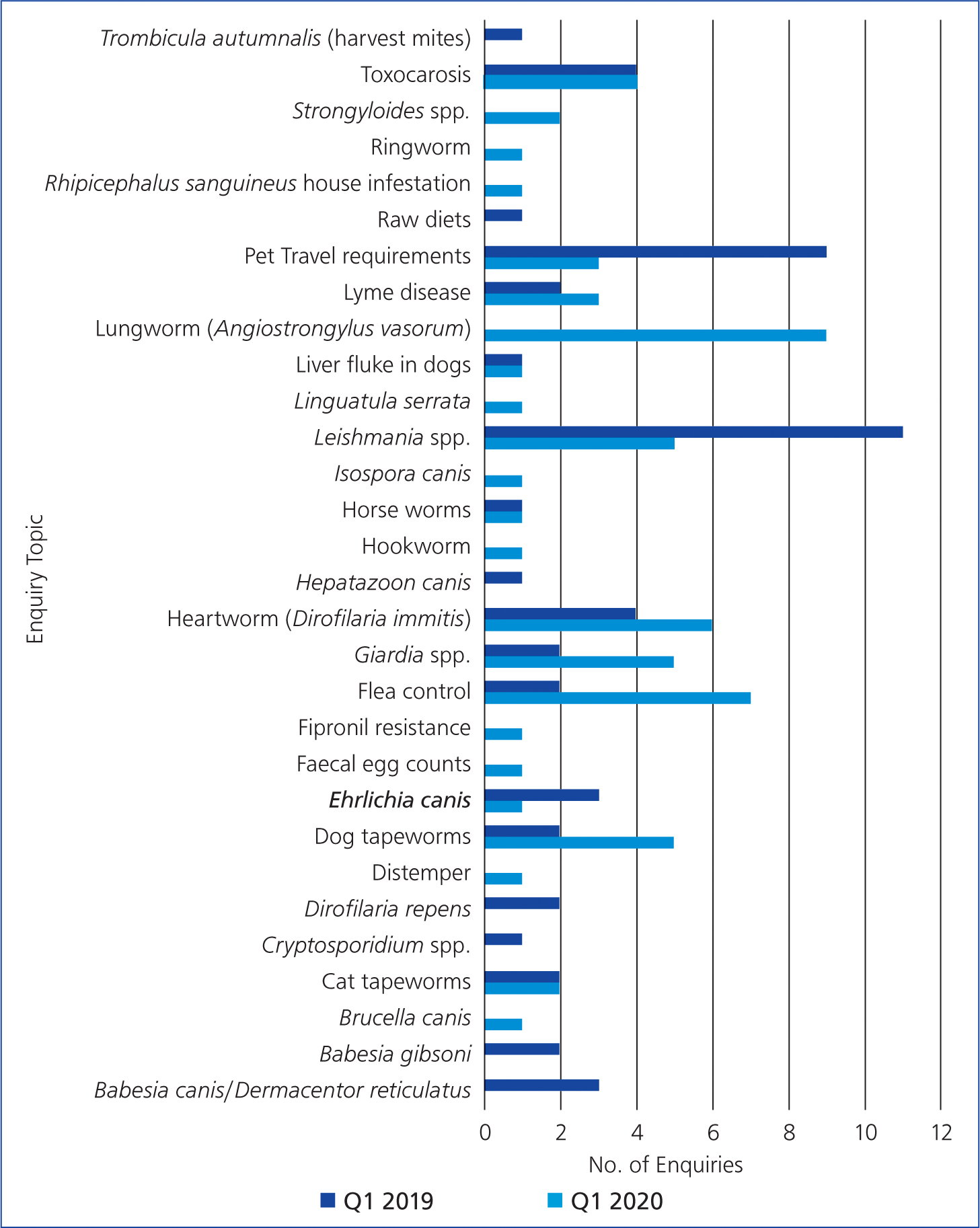
The top five enquiry topics for quarter one (1 January–31 March) this year are:
Although Leishmania spp. enquiries still rank in joint fifth place, the number of enquiries has reduced by over 50%. The reduction in exotic parasite enquiries may be related to the drop in foreign travel associated with the COVID-19 outbreak. Lungworm advertising and CPD or an increase in diagnosis/disease incidence may be driving A. vasorum awareness, while a steep rise in flea infestations appears to have occurred associated with the mild winter. Giardia spp. enquiries have risen significantly following an influx of giardiosis over the winter and early spring.
Following on from the end of 2019, there remain a large number of questions regarding the diagnosis and management of heartworm (Dirofilaria immitis) in imported dogs, as more cases of infected rescue dogs are encountered by UK veterinary surgeons. However, enquiries regarding Babesia spp. have noticeably reduced.
In quarter one 2019, there were five Babesia spp. enquiries (three for B. canis and two for B. gibsoni). Following the news at the end of 2019 that the pathogen B. venatorum was endemic in the UK, this rose to a high 13 enquiries for the period 1 October–31 December 2019 (quarter four 2019). Figure 5 shows the species breakdown of the total Babesia spp. enquiries for quarter four 2019. In quarter one of 2020 there were no Babesia spp. enquiries, instead being replaced in the top five by enquiries about dog tapeworms.
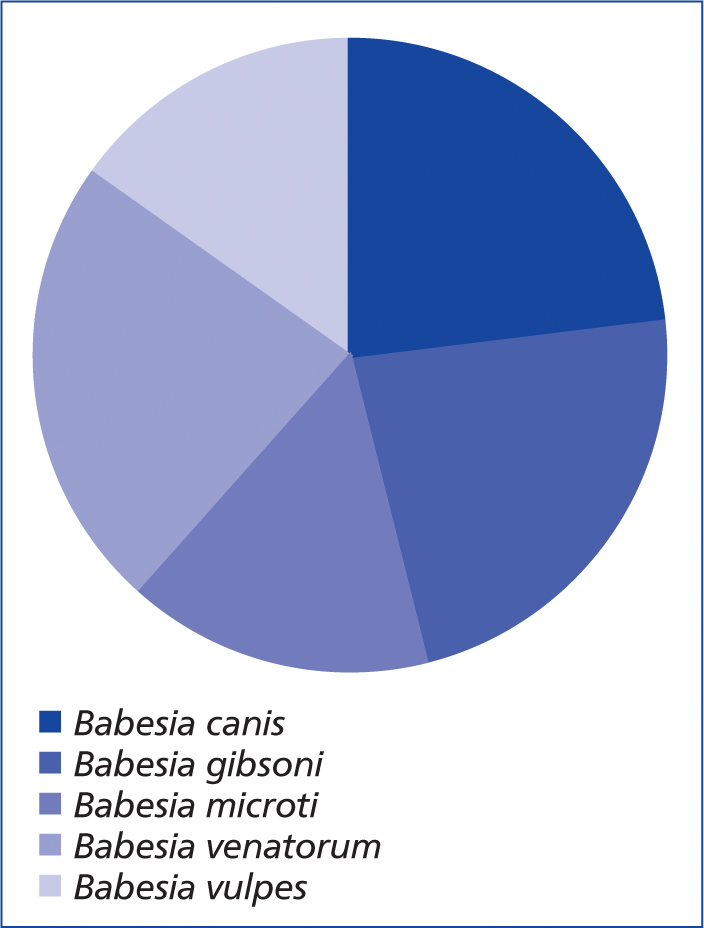
Conclusions
Spring 2020 is unlike any other spring we have had. The COVID-19 pandemic has presented new challenges for all of us and affected us in more ways than we could initially predict. Not only are we now facing challenges with face to face consultations, social distancing and keeping staff and clients safe, but also with ensuring that routine treatments, including parasite control programmes, are maintained safely. We are already seeing the consequences of lungworm treatments being reduced and, if this continues, it will have a significant impact of the morbidity and mortality of our pets.
Conversely, we are seeing a potential reduction in the risk to the UK from exotic parasites as travel oversees has been halted, but pets continued to be imported and awareness of exotic parasite introduction through this route needs to be maintained. We are seeing a heightened awareness of domestic parasites including lungworm, fleas and Giardia spp. so now is a good time to focus on domestic parasite control and raising awareness about the parasites that pets are exposed to every day.
Self-isolation may also provide an opportunity to catch up on the latest parasite information, and ESCCAP UK and Ireland want to help. Visit www.esccapuk.org.uk for more information and to view the Parasite Forecasts and ESCCAP Guidelines.

